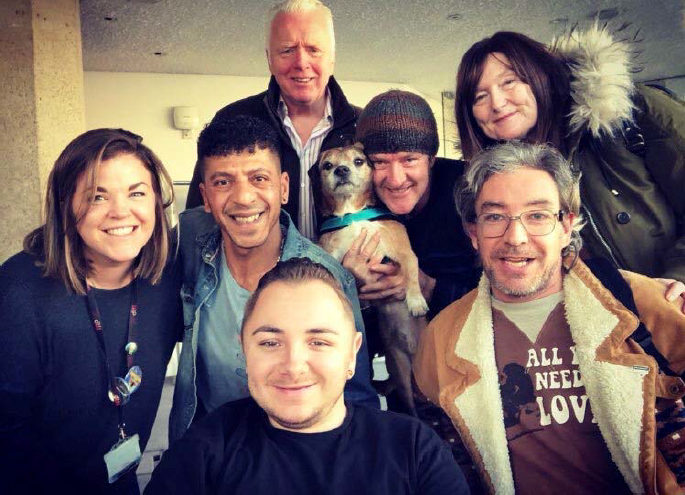Power of Culture Blog
Testifying on Beacon Hill in Support of STEAM
Supporters of H. 561 may submit testimony by email until September 23, 2025
Anita Walker, Executive Director

A homeless man is curled up asleep on the grate by the theater. He’s there every night. Addicts hang out in the alley by the stage door. Theatergoers look away as they pass, annoyed by the intrusion on their lovely evening.
Mandy Precious works at the theater. She doesn’t look away. She invites them in.
Theater Royal Plymouth is located in Plymouth England, “Britain’s Ocean City” according to its slogan. You could also call the city a harbor for the hard luck, cast off, miscreant, and refugee people who wind up in the UK. It is a center for social service agencies. And it is the first line of care for people trying to escape a life of crime, addition, poverty, war, and hardship.
If you suddenly found yourself in the stalls of Theater Royal Plymouth you’d feel like you could be in any one of our Massachusetts venues, watching anything from touring Broadway to ballet.
But this is also an organization that believes the arts are an antidote to loneliness and isolation and a prescription that can relieve trauma sometimes more effectively than psychiatry and medication.
I first met Mandy about a year ago. She is working on a production honoring the voyage of the Mayflower from Plymouth, England to Plymouth, Massachusetts. The 400th anniversary is marked in 2020. She was here to learn more about the Wampanoag people and invite them to participate in a show to be performed in the UK that will involve 100s of people from her community.
We were introduced because of the “400th.” But we connected because of her passion. She is full of stories about the lives that have been saved and changed because of an invitation to come off the street and into her theater. She and her colleague Sarah Baldwin shared their stories with a group of us at the Mass Cultural Council.
“People build relationships with people, not buildings,” Mandy said. She could have just shooed away the men and women hugging the outside of the theater for warmth. But instead she started a conversation. And then they came inside.
“They come in and mess around in the room. There’s a lot of silliness,” she said. But pretty soon they are enticed to tell their stories through theater.
“I thought I was going to die to stand up and speak,” said one man. But “eventually he became addicted to that. We’ve got some guys we just can’t get rid of,” Mandy laughed.
Mandy’s programs are now serving 10,000 people a year. She and Sarah speak with pride of the fact that some are now employed at the theater.
“I have one counting cash that had a criminal record,” Sarah said.
The women tell us about people who have endured such pain and trauma that they cannot describe it to doctors or therapists. But in the community of the theater they have been able to write their way through it and get to the other side.
Mandy told us about an Iranian refugee, who had endured drug problems, the death of family members, political prison and torture, and escape to a foreign country.
“He is now a practitioner working for us. He has empathy,” she said.
Not everyone who benefits from this work can be found leaning against the theater building. So Mandy and Sarah take their program off site to mental health centers and clinics. Mandy says she’ll spend weeks there getting to know people, building trust, before they will follow her to the theater.
They are at the table with virtually all of the social service agencies in the community, from criminal justice to mental health. These relationships are the bedrock of their programs.
One of their partners is called the Good Prison Project. Here the work goes behind bars, often targeting the most challenging inmates. Sarah talks about the time she worked with men who were constantly engaged in self harm. During the five weeks in her program, not one exhibited this self destructive behavior.
And the presence of the theater in the prison has even changed the prison itself. The first experience of a new inmate is a waiting room that used to be a cold, intimidating space with threats and warnings and swear words etched into the concrete walls. Now it has been transformed by prison “set designers” who show the new residents what they can look forward to in the prison theater program.
“Arts are a prescription that’s cheaper than medication,” said Mandy. And she has the research to back this up. It’s research that is changing public policy at the highest level of British government.
British Health Secretary Matt Hancock made news this past month when he said doctors in Britain may soon start prescribing the arts and other activities, something called “social prescribing.”
“We’ve been fostering a culture that’s popping pills and Prozac, when what we should be doing is more prevention and perspiration,” Hancock explained. “Social prescribing can help us combat over-medicalising people.”
This new recognition of the power of the arts to encourage good health and well-being has “flipped the deficit funding model,” according to Mandy. Instead of doing the work and then begging for funding, funders and government are coming to her with money asking her to do the work.
Mandy and Sarah’s programs are very much like the work of the more than 70 Creative Youth Development programs in Massachusetts, along with the outreach of countless other cultural nonprofits in the Commonwealth.
The breakthrough in Britain is a new legitimacy. The official acknowledgment by government that the arts play an important and effective role in the well-being and health of people.